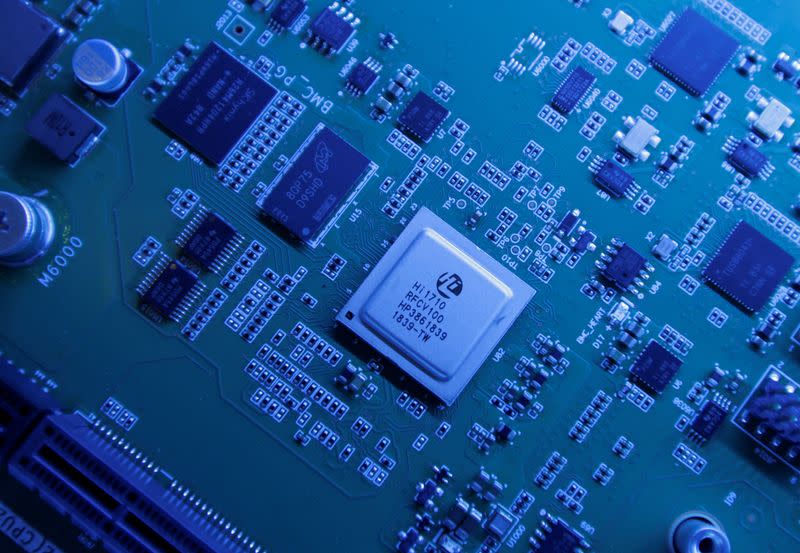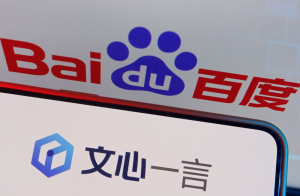Tech giant Huawei is supplying AI firm Baidu with artificial intelligence chips, it has emerged, as US tech curbs force Chinese firms to build new domestic supply lines.
Baidu agreed the $62 million order with Huawei this year, sources said, adding to signs that US pressure is prompting Chinese acceptance of Huawei’s products as an alternative to market leader Nvidia’s.
One of the people said Baidu, one of China’s leading AI firms, which operates the Ernie large language model (LLM), placed the order in August, ahead of widely anticipated new rules by the US government that in October tightened restrictions on exports of chips and chip tools to China, including those of US chip giant Nvidia.
Also on AF: Multinationals Eye Production Shifts, China Blamed: ECB Survey
Baidu ordered 1,600 of Huawei Technologies’ 910B Ascend AI chips – which the Chinese firm developed as an alternative to Nvidia’s A100 chip – for 200 servers, the source said, adding that by October, Huawei had delivered more 60% of the order, or about 1,000 chips, to Baidu.
The second person said that the order’s total value was approximately 450 million yuan ($61.83 million) and that Huawei was to deliver all of the chips by the end of this year. Both people declined to be named because the details of the deal were confidential.
Although the order is tiny relative to the thousands of chips top Chinese tech firms have historically ordered from Nvidia, the sources said it was significant, as it showed how some firms could shift away from the US company.
Baidu, alongside Chinese peers such as Tencent and Alibaba, is known to be a long-time client of Nvidia. Baidu was not previously known to be an AI chip customer of Huawei.
Although Huawei’s Ascend chips are still seen as far inferior to Nvidia’s in terms of performance, the first source said they were the most sophisticated domestic option available in China.
“They were ordering 910B chips to prepare for a future where they may no longer be able to purchase from Nvidia,” the first source said.
Huawei’s website says it has since 2020 collaborated with Baidu to make its AI platform compatible with Huawei hardware. In August, the two companies said they would deepen compatibility between Baidu’s Ernie AI model and Huawei’s Ascend chips.
Baidu’s Kunlun AI Chip
Baidu has developed its own line of Kunlun AI chips, which the company says supports large-scale AI computing, but the company has mainly relied on Nvidia’s A100 chip to train its LLM.
After the US last year imposed rules stopping Nvidia from selling its A100 and H100 chips to China, the company issued new A800 and H800 chips as alternatives for Chinese customers, including Baidu. Nvidia is no longer able to sell those chips to China because of the October rules.
Analysts predicted last month that the US curbs would create an opening for Huawei to expand in its $7 billion home market. The company has been the subject of US export controls since 2019.
The order adds to signs of technological advances for Huawei, as Beijing pours investment into its domestic semiconductor industry to help it catch up with overseas peers and urges state-owned firms to replace foreign technology with domestic alternatives.
Huawei drew substantial global attention in August when it unexpectedly unveiled a new smartphone that analysts said uses internally developed processors featuring advanced semiconductor technology, highlighting the company’s progress in chip development despite sanctions.
In September, Reuters reported that Huawei’s in-house chip design unit, HiSilicon, had commenced shipments of newly developed Chinese-made processors for surveillance cameras to clients in 2023 in another comeback sign.
- Reuters with additional editing by Sean O’Meara
Read more:
Huawei, US-Sanctioned Firms Win as China Dumps Western Tech
US Chip Export Ban Seen as Big Opportunity for Huawei
Baidu Claims Its Latest Ernie AI Is a Match for ChatGPT
Nvidia May See $5 Billion Hit From Early China Chip Curbs – WSJ
Foxconn, Nvidia to Build ‘AI Factories’ Producing Intelligence























